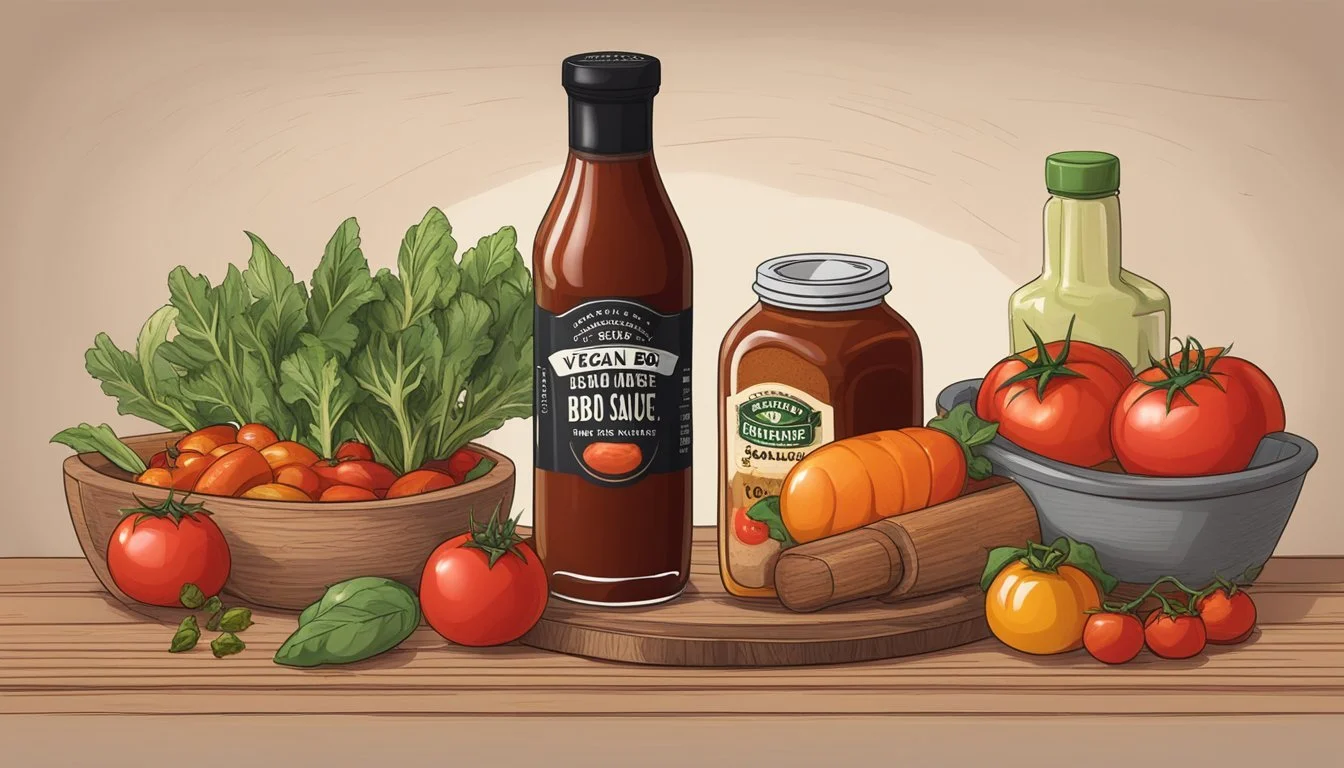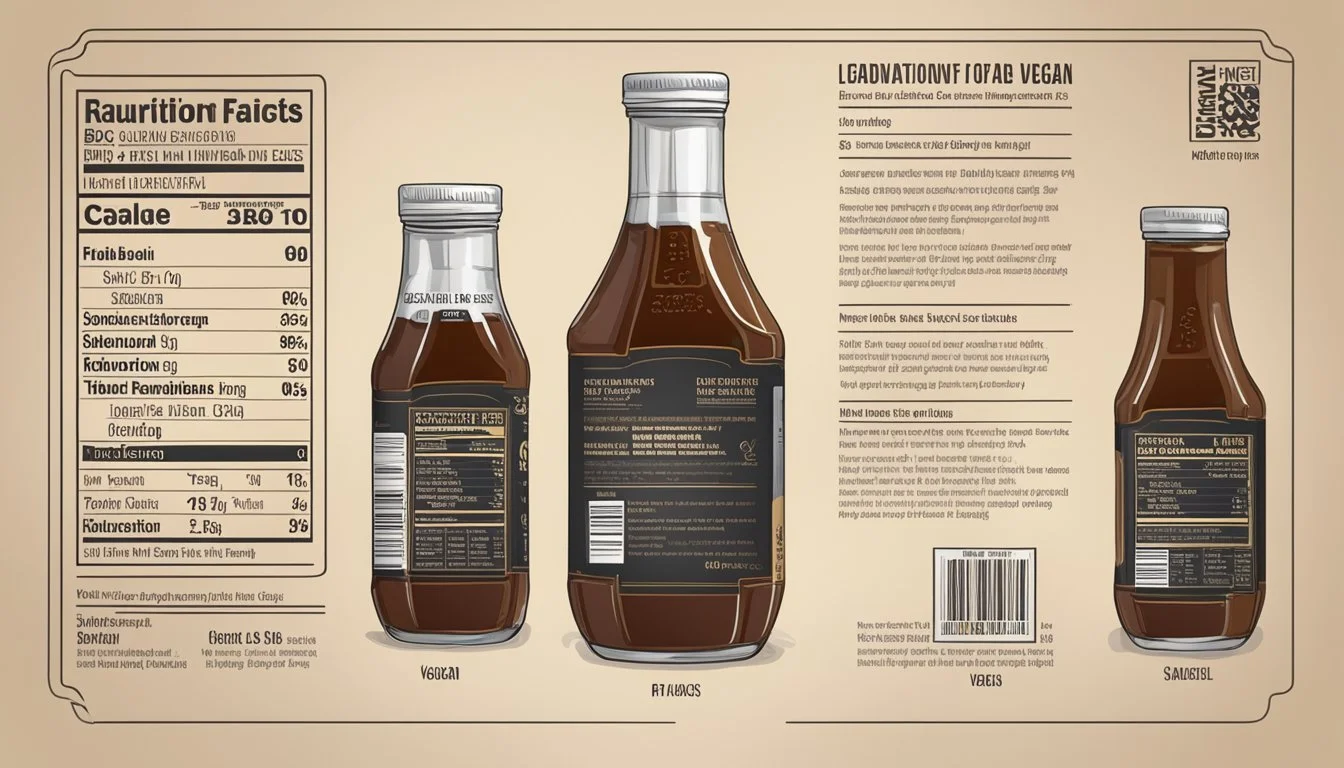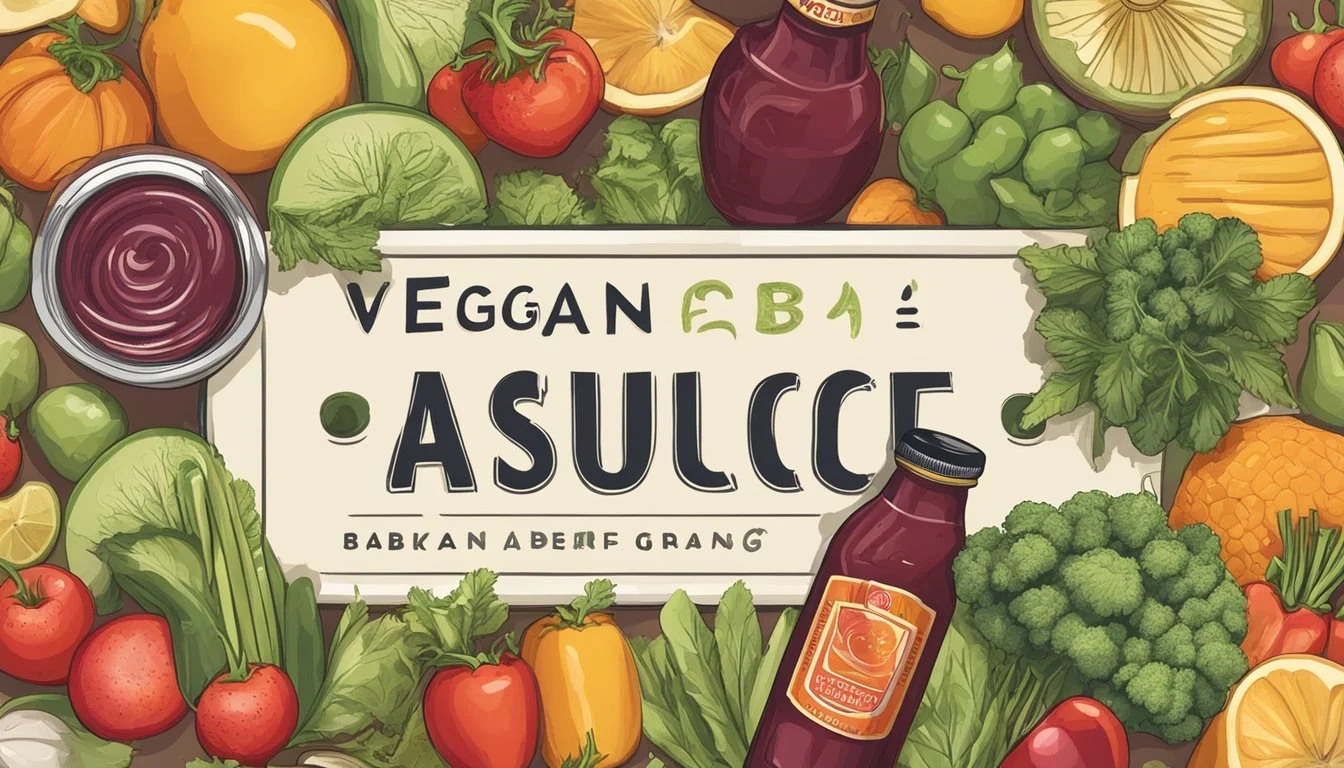Is BBQ Sauce Vegan?
Unveiling the Ingredients for Plant-Based Diets
When considering a vegan diet, an individual often scrutinizes labels to identify hidden animal-derived ingredients. Common foods like BBQ sauce are typically assumed to be vegan, but this isn't always the case. Most BBQ sauces have a base of vinegar, tomato paste, and a blend of spices, which are inherently vegan. However, variations in recipes can introduce non-vegan elements.
The most common non-vegan ingredient found in BBQ sauce is honey, which is used as a natural sweetener in many brands. Authenticity of veganism in BBQ sauces can also be compromised by less obvious ingredients like natural flavors and certain types of sugar processed with bone char. Consequently, consumers opt for brands that transparently reveal their ingredient sourcing and manufacturing processes.
Navigating the plethora of available BBQ sauces can be simplified by identifying brands committed to vegan values. Various brands explicitly label their products as vegan, eliminating the guesswork involved in selection. Examples like Annie’s Original and hickory-smoked BBQ sauces and Primal Kitchen's line are certified vegan, offering peace of mind to consumers seeking plant-based condiments.
What Is BBQ Sauce?
BBQ sauce is a popular condiment with a rich history in American cuisine. It boasts a diverse palette of flavors, primarily known for its characteristic sweetness and tang, often accompanied by a smoky undertone. The spectrum of tastes within BBQ sauces can range from bold and spicy to mellow and savory, catering to a variety of palates.
Central to BBQ sauce's flavor profile is the smokiness, which is typically achieved through the addition of liquid smoke or by the process of smoking ingredients. This smoky flavor imparts a unique depth, reminiscent of traditional barbeque cooking methods.
Ingredients commonly found in BBQ sauce include:
Tomato paste or ketchup
Vinegar
Sugar or molasses
Spices (such as mustard, black pepper, or paprika)
Flavorings (like liquid smoke)
These ingredients are combined to create a sauce that can both marinate meats and serve as a topping or side. The boldness of flavors within BBQ sauce not only makes it a versatile kitchen staple but also a key feature in many barbeque dishes.
Given its versatility, BBQ sauce is used across various American regional cuisines, each adding its own twist to the condiment. It can be tailored to be more sweet, tangy, or spicy. However, the underlying principle is that BBQ sauce should enhance the overall taste of the food without overpowering it. It should complement the natural flavors of the barbecued meats (What wine goes well with barbecued meats?) or vegetables it accompanies, making it an essential element in American cookouts and meals.
Exploring Veganism
Veganism is a dietary and lifestyle choice wherein individuals abstain from using animal products, particularly in diet. Adopting a vegan lifestyle involves careful consideration of ingredients to ensure they are plant-based and do not contribute to animal exploitation. When assessing foods like BBQ sauce, vegans look for plant-based ingredients and avoid products derived from animals.
The typical ingredients in vegan BBQ sauce include:
Tomato paste or puree
Vinegar
Sweeteners such as agave nectar or maple syrup
Spices such as paprika, garlic powder, and onion powder
It’s essential for vegans to scrutinize labels for non-vegan ingredients. Honey, for example, is commonly used in BBQ sauces but is not considered vegan. Mayonnaise, which sometimes sneaks into gourmet sauces, often contains eggs, making it unsuitable for vegans.
Vegans also seek out alternative sources of protein. While BBQ sauce is not a significant source of protein, the dishes it accompanies often are. Therefore, it is common to find BBQ sauce paired with plant-based proteins like tofu, tempeh (What wine goes well with tempeh?), or seitan (What wine goes well with seitan?) in vegan cuisine to provide nutritionally balanced meals.
Ingredients are at the heart of vegan cuisine, reflecting a commitment to animal-free eating. Through vigilant label reading and the selection of certified vegan products, individuals maintain their adherence to vegan principles in all aspects of their diet, including when enjoying a flavorful BBQ sauce.
Understanding Vegan BBQ Sauce
When selecting a vegan BBQ sauce, it’s essential to scrutinize the ingredients for animal derivatives and to be aware of vegan-friendly alternatives as well as store-bought options that align with a plant-based diet.
Identifying Non-Vegan Ingredients
Many BBQ sauces appear vegan at first glance, as their primary components include tomato paste, vinegar, sugar, and various spices. However, some contain ingredients such as honey, which is an animal product, and sugar that may have been processed with bone char. In addition, some sauces may include worcestershire sauce, which traditionally contains anchovies, or use high fructose corn syrup, which can also be a concern for those on a strict vegan diet due to processing methods.
Vegan Ingredient Alternatives
When preparing homemade vegan BBQ sauce, a range of plant-based substitutes can be used to maintain the sauce's depth of flavor. Here are some vegan-friendly alternatives:
Sweeteners: Opt for maple syrup or organic brown sugar instead of honey or conventional sugar.
Umami Flavor: Tamari or soy sauce can replace non-vegan worcestershire sauce.
Tangy Depth: Apple cider vinegar is a vegan-friendly option that adds tanginess.
Smoke Flavor: Liquid smoke or smoked paprika provides a smoky flavor without animal products.
Thickening Agents: Molasses can be used to add body and richness to the sauce.
Commercial Vegan BBQ Sauce Options
For those seeking store-bought vegan BBQ sauce, there are numerous options available that cater to vegan dietary preferences. Consumers should look for brands that specifically label their sauces as vegan or check for certifications indicating organic or vegan ingredients. Brands like Annie's offer vegan-certified options that avoid the use of honey, and alternative sweeteners like high fructose corn syrup.
Ingredients to look for in vegan BBQ sauces:
Organic or natural sugar
Tomato paste or ketchup
Vinegar (apple cider, white, balsamic)
Spices (garlic powder, chili powder)
Plant-based flavorings (soy sauce, tamari)
Natural smoke flavor
It's advisable to read ingredient labels carefully or choose products with vegan certification to ensure that the BBQ sauce meets vegan standards.
Homemade BBQ Sauce Recipes
Homemade BBQ sauce allows for customization to suit individual tastes. It ensures that the sauce is vegan by enabling control over all ingredients.
Basic Vegan BBQ Sauce Recipe
A fundamental vegan BBQ sauce can be crafted with ingredients such as tomato sauce for the base, apple cider vinegar for tanginess, and a choice of sweeteners like brown sugar or maple syrup. The standard approach is to combine these ingredients in a saucepan:
Tomato sauce: 1 cup
Apple cider vinegar: 1/4 cup
Brown sugar or Maple syrup: 3 tablespoons
Garlic powder: 1 teaspoon
Onion powder: 1 teaspoon
Smoked paprika: 1 teaspoon
Salt: 1/2 teaspoon
Black pepper: 1/4 teaspoon
Cayenne pepper: 1/4 teaspoon (optional for heat)
Liquid smoke: 1 teaspoon (optional for a smoky flavor)
Instructions: Whisk together all ingredients in a medium-sized saucepan. Bring the mixture to a simmer over medium heat, then reduce to low heat and allow the sauce to simmer for about 10-15 minutes, stirring frequently, to let the flavors meld and sauce thicken to the desired consistency.
Creating Flavor Variations
Experimenting with various sugars like coconut sugar or date syrup can introduce new sweetness profiles to the BBQ sauce. Spices such as mustard powder, Dijon mustard, or yellow mustard can be added for complexity. Flavor variations can be achieved by adjusting the quantities or adding extra components:
Sweetness: Adjust level of sweetness by varying the amount of sugar or syrup.
Spiciness: Increase cayenne pepper, or add chipotle powder for more heat.
Tanginess: Add more apple cider vinegar if a tangier taste is desired.
Smokiness: Incorporate more liquid smoke or smoked paprika.
To tailor the flavor, cooks should taste the sauce as they go, adding additional spices or sweeteners incrementally until they reach their preferred balance.
Nutritional Information
When considering the nutritional profile of vegan BBQ sauces, it's essential to examine the caloric content, macronutrients, and micronutrients. These factors contribute to understanding the overall nutritional value of the sauce.
Caloric Content
Vegan BBQ sauce's caloric content primarily comes from carbohydrates, with a typical serving providing approximately 50-70 calories. These figures can vary depending on ingredients like sugar and oil.
Understanding Macronutrients
Carbohydrates are the main macronutrient in vegan BBQ sauce, typically ranging from 10-20 grams per serving. This includes sugars added for sweetness. Such sauces generally contain minimal protein and fat, though certain brands may use ingredients that slightly increase these macronutrients.
Protein: Usually less than 1g per serving
Fat: Typically ranges from 0-1g
Saturated fat: Rarely present, it's negligible in most recipes.
Micronutrients in BBQ Sauce
Micronutrient content in BBQ sauce can vary, but it often includes:
Sodium: 200-600mg (Can be significant, necessitating attention by those monitoring salt intake)
Potassium: Present in smaller amounts, contributing to the overall electrolyte balance
Fiber: Minimal, given the strained and smooth consistency of the sauce
Vitamin C: Sometimes found due to tomato-based ingredients
Calcium and Iron: Trace amounts can be present, derived from the spices and other ingredients used
It's important to read labels or recipes for a precise breakdown, as micronutrient presence can be very recipe-specific.
Storage and Preservation
Ensuring the longevity of BBQ sauce, whether homemade or store-bought, is paramount. Proper storage techniques prevent spoilage and maintain flavor over time.
Storing Homemade Sauce
Homemade BBQ sauce should be stored in an airtight container or glass jar to retain its quality. One should transfer the sauce to the container immediately after it cools to room temperature. It's essential to cover the sauce tightly before placing it in the refrigerator, where it can last for up to a week.
Freezing and Thawing
To freeze homemade BBQ sauce, one should let it cool completely before transferring it to a freezer-safe container. Freezing can extend the sauce's life for up to three months. When ready to use, they should thaw the sauce in the refrigerator overnight. It's important to stir the sauce after thawing to ensure consistency is maintained.
Shelf Life of Store-Bought Varieties
Store-bought BBQ sauces have a longer shelf life due to preservatives. An unopened bottle can be kept in the pantry at a stable temperature. Once opened, one should refrigerate the sauce, ensuring the lid is tight. The typical shelf life in the refrigerator for an opened bottle ranges from 4 to 6 months. Always check the expiration date for guidance and inspect the sauce before use.
BBQ Sauce in Vegan Cooking
Barbecue sauce often brings a robust, tangy flavor to dishes and is a popular condiment in vegan cooking. Its versatility allows it to pair well with plant-based proteins, enhancing their taste and adding a smoky depth.
Vegan BBQ Tofu
BBQ Tofu is a staple for many vegans, particularly as a protein-rich element in a variety of dishes. When preparing BBQ Vegan Tofu, one starts with pressing the tofu to remove excess moisture, ensuring it can absorb the flavors of the vegan BBQ sauce. Once marinated, it can be either baked or grilled, providing a crispy exterior and tender interior. Slices of BBQ tofu often serve as a side dish, can be diced for salad toppings, or stuffed into sandwiches.
Baked BBQ Tofu:
Cut tofu into slices or cubes.
Marinate in vegan BBQ sauce for at least 30 minutes.
Bake at 375°F (190°C) until the edges are crispy, about 20-30 minutes.
BBQ Vegan Jackfruit
Jackfruit works remarkably well as a meat substitute due to its texture, which resembles pulled pork when cooked. For BBQ Vegan Jackfruit, the fruit is shredded and then sautéed to develop a slightly crispy texture before being smothered in vegan BBQ sauce. It's especially popular in vegan pulled pork sandwiches or as a filling for tacos and wraps.
BBQ Jackfruit Preparation:
Rinse, drain, and shred canned young green jackfruit.
Cook in a pan until slightly browned.
Add vegan BBQ sauce and simmer until it thickens.
Other Vegan Dishes with BBQ Sauce
Vegan BBQ sauce can also elevate a variety of other dishes. It can act as a dipping sauce for veggie burgers, nuggets, or pizza. It can either complement the main ingredients as a condiment or be used as a marinade to infuse vegan dishes with its distinct flavor. It is not uncommon to find vegan BBQ sauce drizzled over crispy baked tofu, brushed onto veggies before grilling, or dotting a vegan pizza as a flavorful alternative to traditional sauces.
Tips and Tricks
Creating vegan BBQ sauce requires attention to detail, pointing toward the importance of consistency, taste, and how to serve the sauce. This section offers practical advice to enhance these aspects of your BBQ sauce.
Achieving the Right Consistency
The key to the perfect vegan BBQ sauce consistency lies in a balance of liquid and thickening ingredients. One should start by combining ingredients like organic ketchup, maple syrup, and molasses in a saucepan. While the sauce simmers on medium-low heat, they can gradually add water to thin it if required. A consistent simmer allows the sauce to thicken naturally without compromising the flavors.
Enhancing Flavor Profiles
To intensify the flavors in vegan BBQ sauce, chefs can experiment with a mix of sweet, tangy, and spicy elements. For sweetness, maple syrup serves as an excellent plant-based option that also adds a subtle richness. Apple cider vinegar can introduce a tangy profile, whereas a pinch of smoked paprika or chipotle provides a smoky undertone. Adjustments should be made with precision; using measurements can aid in achieving the right balance.
Serving Suggestions
Vegan BBQ sauce is versatile and can be used in various dishes to add a rich, smoky, and tangy flavor. When cooled, it can be served as a condiment with grilled vegetables (What wine goes well with grilled vegetables?) or plant-based proteins. As a marinade, it infuses a deep smoky flavor into tofu or tempeh. The sauce can also be used as a glaze for vegan meat substitutes during the last few minutes of baking or grilling to enhance taste and texture.







